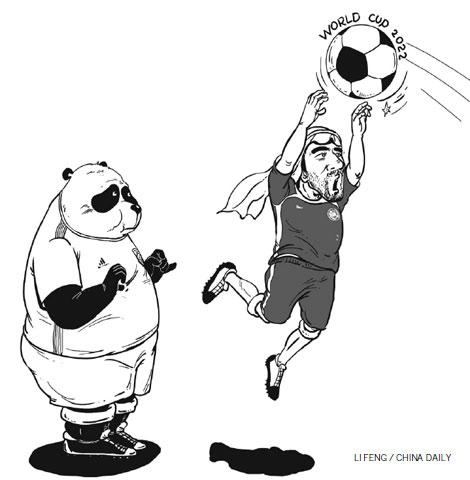
Millions of soccer fans in China are now getting up in the middle of night or staying awake to watch the Football World Cup being played in distant Brazil. Inspired by the talent of the best soccer players and the overwhelming international attention that the World Cup gets, many Chinese soccer fans may be wondering how long they will have to wait to see the tournament being played on home turf. It could happen sooner than some think.
Within days of the conclusion of the World Cup on July 13 (July 14 in China), Michael J. Garcia, FIFA's chief investigator, is expected to submit the results of his yearlong investigation into possible corruption in the awarding of the 2022 World Cup to Qatar. If Garcia's report finds that Mohamed Bin Hammam, a former FIFA executive committee member from Qatar, paid bribes to gain votes for his country, a new host may have to be found quickly.
Major FIFA sponsors, such as Sony, Visa and Adidas, have urged FIFA to take the bribery allegations seriously. And sponsors really count because they contribute nearly 10 billion yuan ($1.61 billion) over the four-year World Cup cycle. Already, FIFA President Joseph Blatter has said that awarding the World Cup to Qatar was a mistake, and FIFA Vice-President Jim Boyce has promised to support a new vote if corruption is proven in the Qatar affair.
With this year's World Cup in South America and the next in Europe (Russia competes in the European leg of FIFA qualifiers), FIFA logically would want to keep the 2022 World Cup in Asia (Africa hosted the 2010 World Cup). Japan and South Korea, co-hosts of the only World Cup played in Asia in 2002, are not likely to be awarded another soon. And Middle East countries in general might be tainted by the Qatari controversy. So China could emerge as a strong contender to host the 2022 Cup.
FIFA sponsors might love the idea. Unlike Qatar, which would be the least populated country to host the tournament, China has the world's largest population - a boon for sponsors. China also has a big head start with infrastructure and experience. The 2008 Summer Olympic Games and the 2010 World Expo showed Beijing and Shanghai at their best. Hosting the World Cup would allow China to showcase other cities too. (In Brazil, games are being played in 12 cities.) Also, the opportunity to demonstrate Chinese hospitality across the country could generate goodwill and soft power for China.
Another incentive is that China would automatically qualify to compete in the World Cup - only the second time in history. Home team spirit, along with the promotional run-up to World Cup would accelerate the China's efforts to catch up with top soccer-playing nations like Brazil, Argentina, Germany, Italy, Spain, England and others that have also hosted the Cup.
Still, the big question remains: Would Chinese decision-makers want the World Cup? A potential downside is the competitiveness of the Chinese men's soccer team. At the Beijing 2008 Olympics, Chinese athletes won 100 medals, more than half of them gold, elevating the home country to the top of the medals table. This impressive feat seems unlikely to be repeated with soccer, though. The technical and physical excellence of Chinese athletes may not be enough for the international soccer stage, where a few creative moments - built on years of experience and national tradition - can be decisive.

Copyright ©1999-2018
Chinanews.com. All rights reserved.
Reproduction in whole or in part without permission is prohibited.